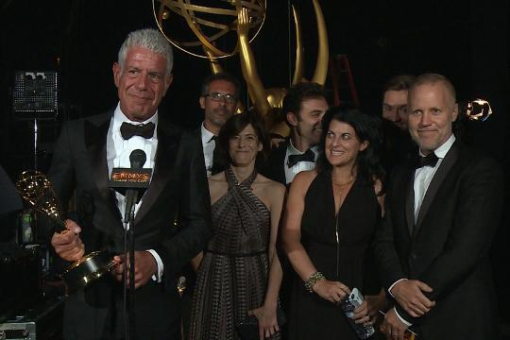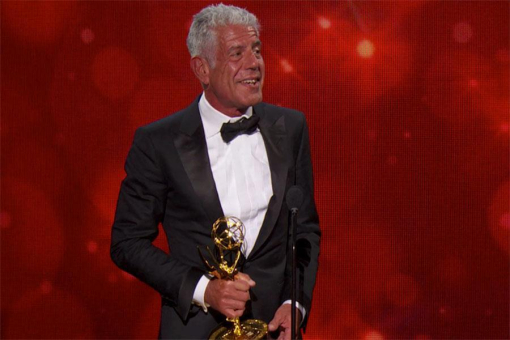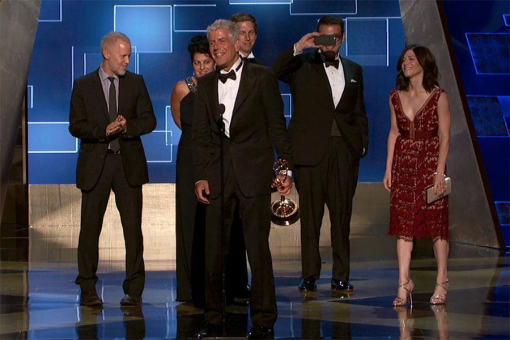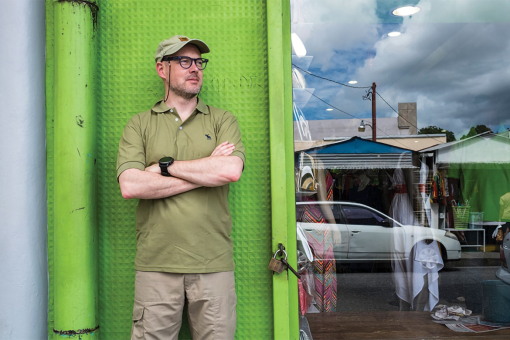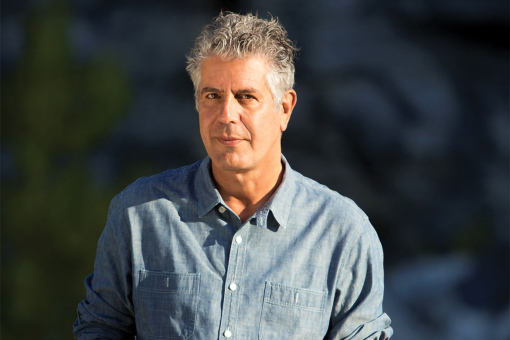Before he became the world's coolest television host — introducing viewers to places they'd never dreamed of seeing and dishes they'd never imagined eating — Anthony (or Tony, as he was known by friends and colleagues) Bourdain was a successful New York chef and a writer. When he died by suicide in 2018, he was in production on Parts Unknown, the highest-rated hour on CNN. But as Charles Leerhsen explains in his recent biography, that success was built on the know-how he'd gained on two previous shows — and the gradual shaping of his magnetic TV persona.
Tony Bourdain may have seemed like the ultimate anti-authoritarian, take-this-job-and-shoveit sort.
But when his 2000 book Kitchen Confidential became a bestseller and made him at least semi-rich, he didn't immediately leave Les Halles, the Manhattan brasserie where he was executive chef. He'd been around the restaurant business long enough to know that success can go south quickly.
He wouldn't become a household name or face until he got a regular TV gig. But in early 2001, Tony wasn't dreaming of upping his Q Score or of anything long-term concerning television. Kitchen Confidential by its nature did not lend itself to adaptation, as a short-lived sitcom based on the book would prove beyond a doubt.
One afternoon he got a visit in the restaurant from two "important-looking" men eager to talk about transforming his memoir into a reality series. He wisely declined the opportunity without even passing it by his agent. His way of capitalizing would be the traditional and relatively dignified one: he would write another book that would be marketed as "by the author of Kitchen Confidential."
What the book would be about, though, he didn't immediately know. Book ideas had never been Tony's strong suit. The one he eventually came up with was, essentially, that he would "travel the world in search of the perfect meal."
Although it may at first seem otherwise, that idea was too on the nose, too obvious to ever blossom into something worth reading. But if you call it a TV idea, it improves significantly — especially if you consider what Tony looked and sounded like, his status as a veteran chef, how prone to interesting first impressions of places and things he always was, and the fact that he was still for all practical purposes a travel virgin.
But don't take my word for it. Consider how TV pro Lydia Tenaglia reacted when she saw a newspaper item saying that Bloomsbury had signed Anthony Bourdain for a travel book, which would be about his traveling the globe in search of the perfect meal: she snapped to attention and showed the story to her boyfriend-colleague Chris Collins, sitting at the next desk.
When they read on together and learned that Tony would be heading out soon for Japan and from there moving on to Vietnam and then to Cambodia and so forth in search of a meal that any fool would instantly know he was never going to actually discover, Tenaglia said, "That's our shooting schedule!" — and cold-called him at Les Halles.
Tony was initially annoyed by their interest in him. Tenaglia and Collins were not exactly major players in television at the time. They were, rather, freelance shooter-producers whose claim to fame was a blood-soaked reality show called Trauma: Life in the E.R. that ran on the TLC Network. The idea behind Trauma was to tell the true stories of the medical professionals whose lives were then being dramatized and glamorized on the hit NBC series ER.
Trauma was not junk TV. It was produced by the TV arm of the New York Times and had earned four Emmy nominations, but it wasn't the kind of show Tony watched. And when Tenaglia floated the idea of pitching a Cook's Tour show to the Food Network, he decided they had "problems far beyond the usual lack of imagination." Didn't they know that Tony had been publicly knocking Food Network stars like Emeril and Rachael Ray, that his disgust with the channel was, as he'd said, "already shtick, part of a stand-up bit that would live on long after I stopped performing it?"
When they called back a week later to say they had set up a meeting with him through his agent, Kim Witherspoon, to discuss their TV idea further, Tony said he was "actively pissed off. This, I was certain, was a waste of fucking time. I bothered to neither shave nor shower for the meeting."
Tenaglia remembers that when they arrived at Les Halles — in the lull between the lunch and dinner rushes — Tony was sitting at the bar with his chef's whites unbuttoned, having a drink. Apparently he found it hard to maintain his anger in the face of their flattering enthusiasm, because he heard them out graciously when they described very broadly the series they had in mind. And he said yes to their request to just watch him for a while, moving around in the kitchen and issuing orders.
Tenaglia worried about his height (six-foot-four) and the need to keep that from being a distraction for viewers, but she liked that he seemed clearly "in control" of his environment. She also liked that he was warming to the idea of having them come with him as he made his trip around the world.
In an interview they filmed a few days later in the restaurant's basement, Tony made what she called a romantic little speech about the possibility of traveling the world at his age (forty-four) and expressed his gratitude for finally getting to wander. The Food Network took one look at the heartfelt, ten-minute soliloquy and agreed to two seasons, an initial order of twenty-three episodes, of the barely sketched out series.
And so began a journey full of joy and money and sex and love that he would never come home from.
Watching him go, over the course of twenty-three seasons, from A Cook's Tour (Food Network, 2002–03) to No Reservations (Travel Channel, 2005–12) to Parts Unknown (CNN, 2013–18), would be like watching the Beatles evolve from a quartet of jangly mop tops to a fraught little artists' commune that could no longer cohere. Pretty much everything about Tony's TV work would get richer, more nuanced, and also sadder as time passed.
A Cook's Tour was "that earlier, less good show on that other, crummier network," he would write in later years, but at least no one could ever accuse it of being too slick. Not so long as Tony strutted about in a goombah-ish black leather jacket that a buddy had picked up for him in a thrift store — or wrote lunkheaded voiceover lines like, "If you don't want to go to Saint Martin, you're too dumb to live!"
In the first episode they shot, in Japan, he still seemed to have one foot in and one foot out of the venture. The raw romanticism of his Les Halles interview abandoned him and he could barely acknowledge the camera. He was so bad that he actually seemed to be bad on purpose.
"There was almost a deep reticence and a slightly adversarial relationship between what we were trying to capture and what he was trying to capture," Tenaglia said.
"Because in his mind he was a writer and he was going to go into that Edo-style sushi place and have this experience and then he was going to go back to his hotel room and write about it. That's a very different exercise than taking your experience and translating that for an audience in a visual medium."
Tenaglia and Collins had gotten married just before setting out on the five-week trip, in December 2000, and they arrived in Tokyo with a feeling of elation: new project, new friend, new life. But when they retired to their hotel room to watch the dailies of Tony failing to be a TV presence, they felt sick. Collins saw a man who "did not engage with us, who would not acknowledge our presence and that we were working together."
They both surmised that Tony was using the show as a way to cover his book's travel expenses, but that otherwise he resented their presence on his world tour.
"It was a ruse, it was him thinking, 'I'm going to double-dip here,'" Collins said. Then, while they were tearing their hair out, Tony announced that he was going back to New York for a while.
"You gotta fly home?" Collins said.
"I always cook dinner for my wife's family, Christmas dinner."
The holidays are often a time of dashed expectations and corresponding adjustments. For whatever reason, though, when Tony returned to Japan, less than a week after he'd left (and somewhat to the surprise of Tenaglia and Collins, who'd thought it was fifty-fifty they'd ever see him again), he seemed willing to treat the cameras as something other than an enemy, to put aside his them-against-me feelings, and start to settle in with what would soon become his new family: Tenaglia, Collins and associate producer Diane Schutz.
For a TV neophyte, he had (and would always have) remarkably strong opinions about the medium and the ways the show should and shouldn't present him to the public. Now, at least he was able to maintain a sense of humor about it all, even when the standing around and waiting that comes inevitably with documentary television cut into his daily writing time.
By the time they got to Vietnam, the second stop on the tour, Tony was already starting to enjoy — as he wrote in his 2010 book, Medium Raw — "the new-to-me process of telling stories with the help of an all-new chest of toys: cameras, editing boards, sound editing."
As he walked the streets of Ho Chi Minh City, Tony chatted with Philippe Lajaunie, the co-owner of Les Halles who'd been flown in to be his cohost because of his knowledge of the French colonial culture in Vietnam (and because the team had already discovered that everything worked better when Tony had a buddy to play off).
His research kicked in and "suddenly he was firing on all cylinders with all of these frames of reference, books and films and things he had seen," Tenaglia said in a 2018 interview with The Ringer. "He had his well. And he could dip into the well. We were playing with the idea of film references and book references and going to the Continental Hotel in Saigon, where Graham Greene [had written in the 1950s] and trying to capture that."
It didn't take Tony long to discover that the TV approach sometimes trumped his prose descriptions, especially when it came to food.
In the book A Cook's Tour, for example, he speaks of the high-end Edomae sushi he experienced on the trip thusly: "Perfect. Perfect. The best sushi ever. The best. Far and away. Let me repeat: the best, finest, freshest, best-prepared sushi meal I've ever had." On TV, rather than strain and sputter like that, he could at least show you the food as it was presented, and at the moment of consumption, let you see the pleasure on his face.
But his most critical choice wasn't between print and television just then, it was between the familiar and the unknown, between [his then-wife] Nancy and ... whatever it was that was just around the bend.
"She identified television early on as an existential threat to our marriage," Tony said. "I felt like the whole world was opening up to me. I'd seen things. I'd smelled things. I desperately wanted more. And she saw the whole thing as a cancer."
After he'd finished shooting the first season of A Cook's Tour, Tony had their Riverside Drive apartment completely remodeled in the hope that — even if it didn't save their marriage — a revitalized living space would make Nancy feel more optimistic and secure about the future, whatever it might turn out to be.
But then of course he went right back on the road again, as his contract and by now his heart and mind, too, said he must. He could feel the gears shifting inside him, new priorities coming to the fore. A novice traveler not long before, he now felt proprietary about the world.
"When I'd set out," he wrote in Medium Raw, "I'd see a sunset or a temple and want instinctively to turn to my right or my left and say to somebody, anybody, 'Isn't that a magnificent sunset?'" And now? "I became selfish. That sunset was mine."
He hated to admit it, but he was starting to suspect — God help him — that his show might be important.
After two seasons, "important" was probably not the word the Food Network would have chosen to describe A Cook's Tour. They would have more likely said "expensive," especially considering that their audience much preferred a series called Unwrapped, which showed how things like movie candy and frozen French fries were fabricated in mass quantities, a series that cost a fraction of what A Cook's Tour cost to produce.
For Tony and his TV compadres, taking meetings with network executives became tantamount to taking one on the chin.
That episode he wanted to do with master chef Ferran Adrià, who had agreed to let Tony peek behind the scenes at El Bulli, the avant-garde Spanish restaurant that many called the best in the world? "Yeah, I don't know about that ... our viewers don't have passports." But as for that episode he'd already done, "The Barbecue Triangle" — Kansas City, Houston, North Carolina? "We sure could use a lot more like that."
And so it came to pass that by mutual agreement A Cook's Tour would come to a conclusion at the end of its second season.
It turned out that Tony cared more about not being on television than he liked to admit. Although he was mentally prepared to go back to being a chef if he had to — or perhaps become a full-time book writer — it worried him that Tenaglia and Collins weren't getting a positive response when they pitched a similar series to other networks.
At one point, when the people who'd wanted to produce a Kitchen Confidential reality series reemerged to express their continuing interest, Tony considered saying yes — until his TV partners talked him out of it. Their argument was that if that show flopped, as it likely would, he would be forever tainted as someone who had sold out and lost; he might even wash out of the TV business permanently.
It was good that he waited. In October 2004, after they had been turned down by twelve networks, the Travel Channel — which had been the first to say no — changed its mind and agreed to greenlight three episodes of a series to be named later.
Showing their panache, Tony, Tenaglia and Collins delivered a pilot episode called "France: Why the French Don't Suck." It still needed some shaping, but it was clearly not your grandfather's travel series or even just another episode of A Cook's Tour.
On the day they turned it in to Patrick Younge, the Travel Channel's new president, the top-rated show on the network was the World Poker Tour. After he watched it, Younge didn't say no but he did use the word "fuck." What he said exactly, he told me, was "Well, it's black and white. He's smoking, which means we'll have to go to standards and practices. Where the fuck are we going with this?"
Really, who was this Bourdain guy? All Younge, who is British, knew was that Tony's previous employer had wanted to turn A Cook's Tour into "what we call in the business a chat-and-chew show," and Bourdain didn't want any part of that. So Younge did what network presidents do and assigned executives to help Tony develop his project.
The first few people he asked to work with Tony had too many commitments or dental appointments or some other reason they couldn't oblige him. The job finally fell to Myleeta Aga, who had come to the Travel Channel from the BBC and knew little more about Tony than Younge.
But Aga found herself intrigued by the fact that "so many of my colleagues were saying Anthony Bourdain was so troublesome" and that the show he was proposing "didn't fall squarely in the channel's brief. ... We were servicing a very middle-American audience," she told me, "a sit-back, sip-a-margarita and don't-give-me-too-much-to-think-about crowd — and Tony's show was clearly something else."
The notes she read in the network file indicated that "you really had to lean into a conversation with Tony sometimes because he was so opinionated." Another thing she thought she could see, reading between the lines, was that Tony, however good he was at making TV, was getting a bit carried away with himself and could stand a little reining in.
For example, he was insisting on calling the new show The Bourdain Experience. She greatly preferred — "for its multiple layers of meanings and the curiosity it would pique," as well as for its lack of cheesiness — a title that had been proposed by the network's marketing department: No Reservations.
A heated debate was in the offing, Aga suspected, when she got on her very first call with Tony — who may or may not have said hello before he started insisting that his name be in the title. Whether or not a star would be born, a dick would definitely need to be dealt with.
It just so happened that Aga — the only person at the Travel Channel willing to take on the challenge of turning No Reservations into something more than a cable TV curiosity — also understood the correct balance of acquiescence and limit-setting necessary to get the best out of Anthony Bourdain. In this sense, she was like Tenaglia and Collins, who were sometimes Tony's friends and sometimes his parents, pulling him aside, giving him stern talking-tos, saying, "We know you're tired, but simmer down."
Aga actually liked the fact that even in Tony's first few months at the network, when he was still groping to find his groove, he displayed absolutely no humility. He was someone who, like a book, lent himself to extended study, a man whose measure couldn't be taken in a single meeting.
Tony couldn't help but project an aura of specialness. He wasn't just another big ego who needed nervous young people with Ivy League educations to remove the brown jelly beans from his dressing room bowl. He would move in that general direction as time went on, but at this point he was a man with a clear vision for a TV show.
What still needed birthing was the fully fledged Bourdain persona, the all-important lens through which his audience viewed the world. Watching him do the final construction on his future self was, Aga said, an abiding privilege.
He made the transformation very consciously, with a Hawaiian shirt here, a certain splash of music there, an achingly personal allusion in the voiceover, and an occasional call informing Aga that those fuckers in the marketing department had no idea how to talk about his show. He followed his gut instincts but also incorporated lessons he'd learned from movies and other shows, often negative lessons, things not to do.
"Tony was very deliberately who he was," Aga told me. "He wasn't accidentally who he was."
When it all came together in the middle of the first season, somewhere between Vietnam (a country that for him always induced epiphanies) and New Zealand, she found herself working closely with "a guy who could honestly say, 'Yes, I know why I'm on this planet!' She got swept up in the exhilaration of having an unambiguous hit, as did virtually everyone involved with the show.
If you pooled a bunch of Tony aficionados about the high point of his career, probably no one would say Tony topped out on A Cook's Tour, and many would likely vote for Parts Unknown. But most people will tell you his golden age occurred during the 144 episodes of No Reservations. This was the era in which his social consciousness seemed most satisfyingly countervailed by his hunger for food and fun. He was looser on the show, willing to reveal his vulnerable side for the sake of something other than laughs.
In Malaysia for season one, when a tribal community in Borneo affords him the honor of slaughtering a pig, Tony is flustered. "I'm trying very hard to keep my cool here," he says, sucking hard on a cigarette after driving a spear through the animal's heart. "I'd like to burst into tears and start shaking uncontrollably, but that wouldn't do, would it?"
Emotions were also high three years later, when No Reservations shot in Sardinia. The episode is structured as a family vacation during which Tony, his second wife Ottavia and their one-year-old daughter Ariane meet Ottavia's parents and other relatives and basically eat their way around the Italian-but-not-Italian island where her father was raised and where she vacationed as a child.
Tony says on the voiceover that it feels like "I'm getting a bonus round in life, probably undeserved, from some insane pinball machine and the bonus points just keep kicking in regardless of how I've played. I'm a sickeningly happy guy these days.
"What do you do," he adds, just before the credits roll, "when all of your dreams come true?"
From DOWN AND OUT IN PARADISE: The Life of Anthony Bourdain by Charles Leerhsen. Copyright © 2022 by Charles Leerhsen. Reprinted by permission of Simon & Schuster, Inc. All rights reserved.
This article originally appeared in emmy magazine issue #7, 2023, under the title, "Serial Anthony."






